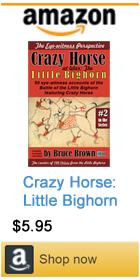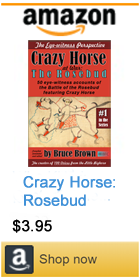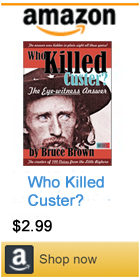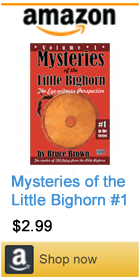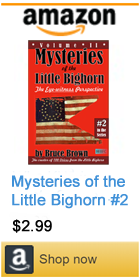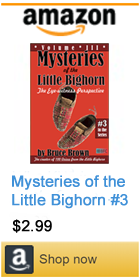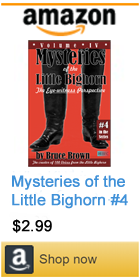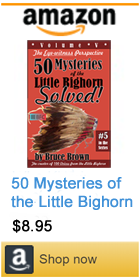|
||||||||||||
Bruce Brown's 100 Voices... Henry Porter's Story of the Battle
DR. HENRY R. PORTER'S ACCOUNT
"We proceeded until four o'clock, the morning of the 25th, when we camped in a deep ravine where the Indians could not see us. We were not allowed to unsaddle or unpack. Being very tired after our long ride, we laid down and slept, each man holding his horse by the bridle reins. In about an hour the scouts reported a large camp of Indians ahead. The command was ordered to get ready for action. Custer came to me and said: 'Porter, there is a large camp of Indians ahead, and we are going to have a great killing.' At six o'clock we started. It was Custer's purpose at this time to charge the Indians in a body, he supposing that our presence had not been discovered by them. In a short time the scouts reported that we had been seen by the Indians. Custer then decided to divide the command. He sent Colonel Benteen with three companies to the left; Major Reno with three companies in the center; and he took three companies and was to go to the right, his idea being to surround the Indian camp. Captain McDougal was left in charge of the pack train. It was about ten o'clock when the command was divided. Just as we were ready to start, Custer came to me and said: 'Doctor, I would like to have you go with me, as you are younger and more robust and Dr. Lord, the chief surgeon is not feeling very well.' I replied, 'All right. I would much prefer going with you.' Custer then said, 'I will see Dr. Lord and ask him to consent.' We rode over to where Dr. Lord was, and Custer spoke to him about the contemplated arrangement. The Doctor replied: 'Not much. I am going with you.' The poor fellow in those few words saved my life and sealed his own doom. I went with Reno. We had proceeded but a short distance when Captain Cook [Lt. W.W. Cooke], Custer's adjutant, came up and said: 'The Indians are right ahead of you, and you are ordered to charge them as fast as possible.' "We went forward at a lively gait. When we came to the river we discovered the Indians were on the opposite bank. We forded the river and suddenly came upon ten or fifteen redskins, and they were running. We then thought that we had already won the fight. We rode some little distance toward the Indian camp, when suddenly a swarm of red devils rose up and poured a terrific fire into us. We dismounted and formed a skirmish line. At first there were only a few, comparatively, then more and more of the savages appeared, and the ground seemed to be fairly alive with them. They were all naked and their bodies were painted hideously. They all rode their ponies bareback. The fire finally became so hot that Reno ordered his men to mount, and led them under cover of the woods. Then the Indians closed in on us, shooting through the branches, killing some of our men. A soldier was shot in the little clump of trees where I was. I dismounted and found him mortally wounded. Reno ordered the troops to mount and charge, and a running fight ensued. My horse was rearing and plunging, and I had all I could do to hold him. The Indians, in their mad pursuit of our troops, did not notice me in the timber. They were passing within ten feet of where I was. I placed laudanum on the wound of the soldier and bandaged it as best I could, and again mounted my frightened horse. As I was leaving the poor soldier said: 'For God's sake, Doctor, don't leave me to be tortured by those fiends.' Bullets were flying thick and fast, and I turned my horse loose and caught up with our troops, who had gotten half a mile away. In that half mile ride I think I was the target of a thousand rifles, but I escaped without a scratch. We again forded the river and took a stand on the top of a steep hill. A few minutes later Benteen, with his three companies came up, as did McDougal, with the pack train. Benteen, after leaving us when the command was divided, had gone west to the river. Not seeing any Indians and hearing the firing he rushed back and joined us. We fought there the remainder of the day, surrounded by three thousand savages, while there were only three hundred of us, all told. The men dug rifle pits with their knives and tin cups, At dark the Indians stopped firing. Some of the men then crawled down to the river and secured water. We had been fighting in the broiling sun. all day without a drop of water, and the wounded were begging for a drink. I had some brandy with me, but I told them that it would make them worse. They insisted on having it, anyway. Next morning the Indians again opened fire on us. Although Reno was ranking officer, Colonel Benteen was really in command, and to his coolness and bravery those of us who were saved owe our lives. With the air thick with bullets and some of them piercing his clothing, he stood calmly directing the troops. Occasionally a band of savages would dash up to within two or three hundred yards of us, and our men would then charge them. Several Indians were killed in these charges, and finally one of the soldiers killed and scalped an Indian in plain view of the others. This frightened them and they kept a safe distance away after that. A perfect storm of leaden hail was poured in on us all day the 26th until about four o'clock in the afternoon, when the firing gradually ceased. We were then frightened, as we thought the Indians were up to some bloodier mischief. Finally we saw them moving off in a body. That night most of the soldiers slept, and were much refreshed in the morning. After the Indians left we were able to procure water. We had all been nearly famished. During the morning of the 27th General Terry and his command came up. He and his staff were all crying, and General Terry said 'Custer and his whole command are killed. We thought you were, too.' "During the two days we were surrounded by the Indians the inquiry among our men for Custer was loud, and that General's court-martial was freely speculated upon. After separating from us Custer had gone through a rough country for a distance of four or five miles and attacked the Indians in the rear. As soon as we could, several of the officers and myself went over to where Custer had fought, and found what General Terry had reported to be only too true. We found Custer's body stark naked, as white and clean as a baby's. He was shot in the head and breast. The body of Captain Tom Custer, General Custer's brother, was horribly mutilated. He was disemboweled, and his head had been crushed in by a blow from a stone hammer used by the Indians. The only arrow wound I found was in his head. He had the Sioux mark of death, which was a cut from the hip to the knee, reaching to the bone. His heart was not cut out, as has been reported by Rain-in-the-Face, one of the Sioux chiefs who took part in the fight. [Note: actually, Rain In The Face denied having anything to do with Tom Custer's death.] I cut a lock of hair from the head of each officer as he lay, and gave it to their families on my return home. The steamer Far West was moored at the mouth of the Little Big Horn. She was the supply boat of the expedition, and had made her way up the Big Horn farther than any other boat. After burying the dead we took the wounded on litters ten or twelve miles to the boat, and I was detailed to go down to Fort Lincoln with them. Colonel Smith, Terry's adjutant general, was sent along with the official dispatches, and he had a traveling bag full of telegrams for the Bismarck office. Captain Grant Marsch, of Bismarck, was in command of the Far West, and the steamer performed a feat unequaled in western steamboating. Marsch put everything in the most complete order and took a large supply of fuel. His orders were to reach Bismarck as soon as possible. The steamer never received the credit due her, nor did her gallant captain. The Big Horn is full of islands, and a successful passage is not an easy feat, but the boat made it without an accident, after a thrilling voyage. At Fort Buford and Fort Stevenson we stopped a minute to tell the news, and at Fort Berthold a wounded scout was put off. Two of the wounded died, and we went ashore to bury them. We approached home with something of that feeling that always moves the human heart. It was one mixed with sorrow and gladness. At eleven o'clock on the night of the 5th of July we reached Bismarck and Fort Lincoln, having made one thousand miles in fifty-four hours. Colonel Smith and myself hurried from the land up town, and called up Colonel Lounsberry, the editor of the Tribune, and the telegraph operator, J. M. Carnahan, who took his seat at the key and scarcely raised himself from his chair for twenty-two hours. What he sent vibrating around the world is history." [Note: here is W.A. Graham's account of how Helena scooped Missoula and Bozeman.] Compendium of History and Biography of North Dakota, Geo. A. Ogle & Co., Chicago, IL 1900 p 160 - 162
Although he did not receive the Medal of Honor (none of the Seventh Cavalry officers did), Dr. Henry Porter was by all accounts one of the true heros of the Battle of the Little Bighorn. Here's John Burkman's account of Dr. Porter providing heroic leadership under fire during the Seige of the Greasy Grass. Porter died in Agra, India, in 1903. -- B.B.
|
||||||||||||



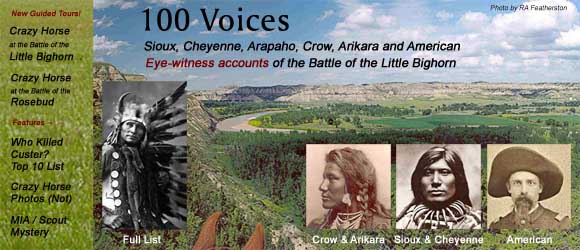
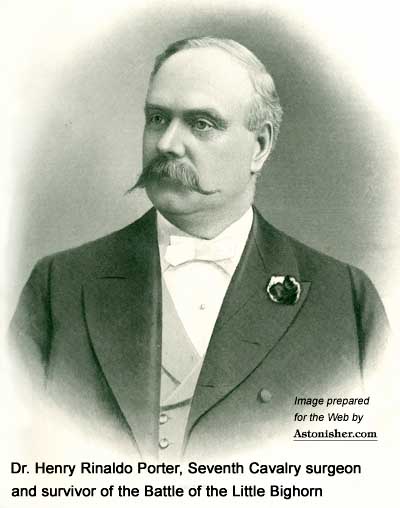 "OUR expedition left Fort Abraham Lincoln on May 17, 1876, under the command of General Terry, and proceeded overland. Mrs. Custer accompanied her husband on horseback as far as Heart River, a distance of several miles, and there bid him an affectionate farewell, and returned to the garrison. We marched in easy stages to Powder river in Montana. Nothing of particular note occurred on the march except that one day we saw, with field glasses, a lone horseman at a distance of several miles. He had evidently seen us and was riding toward our command. We thought of course that he was an Indian, as it did not seem possible that any white man could be off in that wilderness, hundreds of miles from any habitation, alone. As he came nearer we discovered that it was none other than Buffalo Bill, the noted scout and Indian fighter. He was one of General Crook's scouts and was off on an expedition of his own. General Crook's command was then in the region of the Black Hills, miles away. After we had gone into camp at Powder River,
"OUR expedition left Fort Abraham Lincoln on May 17, 1876, under the command of General Terry, and proceeded overland. Mrs. Custer accompanied her husband on horseback as far as Heart River, a distance of several miles, and there bid him an affectionate farewell, and returned to the garrison. We marched in easy stages to Powder river in Montana. Nothing of particular note occurred on the march except that one day we saw, with field glasses, a lone horseman at a distance of several miles. He had evidently seen us and was riding toward our command. We thought of course that he was an Indian, as it did not seem possible that any white man could be off in that wilderness, hundreds of miles from any habitation, alone. As he came nearer we discovered that it was none other than Buffalo Bill, the noted scout and Indian fighter. He was one of General Crook's scouts and was off on an expedition of his own. General Crook's command was then in the region of the Black Hills, miles away. After we had gone into camp at Powder River, 
